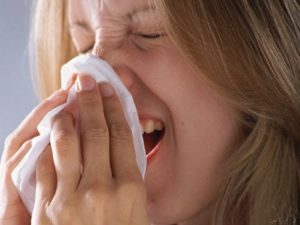Cold and flu season is well and truly upon us. As the temperature continues to drop the chances of contracting a cold or the flu increase.
For most this means curling up with a lemon tea, some tissues and an endless supply of TV shows to get us through. However, for the more vulnerable populations like the elderly and children this can lead to serious health complications.
What’s the difference between the cold and flu?
The common cold and the influenza virus (or the flu) share many similarities and most people tend to use the terms interchangeably. Both illnesses are highly contagious viral respiratory infections but the symptoms and severity can differ greatly.
Both may involve a sore throat, runny nose or nasal congestion, coughing and sneezing. The flu can also involve a productive cough, severe lethargy, a moderate to high fever, severe muscle aches, chills and in some cases even nausea and vomiting.
While a cold typically comes on gradually and recovery takes about a week, the flu comes on more suddenly and the symptoms can be severe lasting up to two weeks.
Preventing cold and flu
Unfortunately, due to the highly contagious nature of viral infections the chance of catching a cold or flu this season is relatively high. However, there are some preventative measures the help:
1. The flu shot
As the common cold and the flu are viral infections antibiotics will not be able to assist with recovery and there is currently no cure.
The best prevention against the flu, is receiving the annual vaccine. While it is not a guarantee that you won’t get sick, the vaccine is the best way to ensure you will not catch one of the prominent strains.
Each year a new vaccine is created based on the strains of the virus that are predicted to be most prominent. This year’s vaccine protects against four separate strains of the flu and can be administered to all ages. It is safe for children from as young as 6 months and even pregnant women at all stages of the pregnancy.
2. Nutrition, exercise and sleep
A combination of these three elements is key to overall health and well-being. The best way to ensure your immune system is ready to fight off any pathogens that may come it’s way is to keep a balanced diet, regularly exercise and receive adequate sleep.
To help boost your immune system try adding foods rich in:
- Vitamin C – Fresh fruits and veggies like citrus fruits, kiwi fruit, strawberries, broccoli, cabbage and parsley.
- Zinc – Red meat, chicken, fish, dairy, eggs, legumes, sunflower and pumpkin seeds.
- Ginger – Helps break down toxins, particularly in the lungs and sinus.
- Probiotics – Good bacteria to help digest nutrients and support your immune system, such as yogurt
3. Keeping distance
Viral infections are highly contagious and can spread very easily from person to person via coughs, sneezes and contact.
If you are aware of a colleague, family member or friend who is sick it’s best to limit contact and sanitize communal areas often. Similarly, if you are sick it is best to avoid contact with healthy individuals so you don’t spread the illness to them.
4. Wash your hands
As viral infections are spread so easily it is important to maintain hygiene standards, particularly relating to hand washing.
At least 20 seconds of washing with soap lathered on your hands and wrists is required to ensure nasty germs are not spread. Pay particular attention to the back of your hands and fingers which are often missed.
While antibacterial sanitiser is handy, soap is the best bet to rid hands of a potential virus. Ensure you are washing your hands after contact with others who may be sick and especially before you eat or touch your face.
5. Watch your coughs and sneezes
If this advice has come a little late and you are already sick try to remember to cough into your shoulder, elbow or tissue instead of your hands.
Coughing and sneezing into your hands can help promote the spread of germs to other surfaces you may touch.

This article was provided by Dr Harvey from House Call Doctor. Dr Harvey is highly experienced in paediatrics, and has administered medical care to children living in remote
overseas communities. He now works with many families, administering acute care when unexpected medical situations arise overnight. All appointments with an after-hours GP from House Call Doctor are 100% bulk-billed, if you carry a Medicare or Department of Veteran’s Affairs (DVA Gold) card.
Find out more about House Call Doctor by viewing their doctors.com.au profile here

